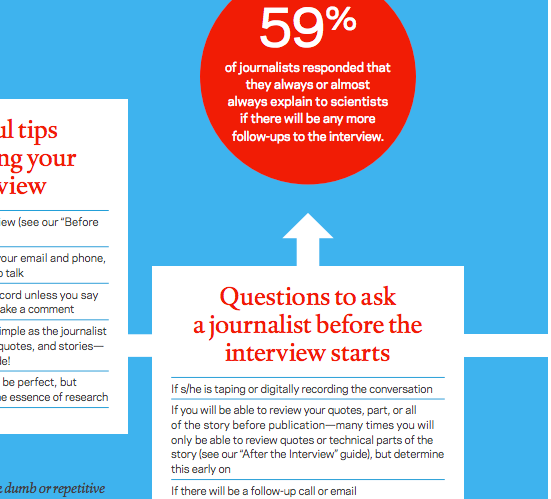Guest post by Jeff Mosenkis of Innovations for Poverty Action. A nicely designed and helpful media guide for researchers on how to prepare for interviews with journalists, based on a survey of science writers. It’s divided into before, during, and after the interview and gives concrete advice about what to expect and do in each. Having two women on a board of directors appears to be the new having one woman on a board of directors. With “tokenism” becoming more obvious, Chang, Milkman, Chugh, and Akinola report a surprising number of S&P 1500 boards of directors with exactly two women, or “twokenism,” as they call it. David’s great links (as always) this week include a few things I was going to mention, so I’ll just refer you to him. Just one addition – Chris’ thread from March, arguing
Topics:
Jeff Mosenkis (IPA) considers the following as important: child development, children, development, health, HIV, job, jobs, Journalism, links, Media, miscellany, news, RCTs, Research, science
This could be interesting, too:
Lars Pålsson Syll writes The pretence-of-knowledge syndrome
NewDealdemocrat writes The (totally contradictory) Big Picture
NewDealdemocrat writes Constitutional Interregnum
Bill Haskell writes Know Nothings
Guest post by Jeff Mosenkis of Innovations for Poverty Action.

- A nicely designed and helpful media guide for researchers on how to prepare for interviews with journalists, based on a survey of science writers. It’s divided into before, during, and after the interview and gives concrete advice about what to expect and do in each.
- Having two women on a board of directors appears to be the new having one woman on a board of directors. With “tokenism” becoming more obvious, Chang, Milkman, Chugh, and Akinola report a surprising number of S&P 1500 boards of directors with exactly two women, or “twokenism,” as they call it.
- David’s great links (as always) this week include a few things I was going to mention, so I’ll just refer you to him. Just one addition – Chris’ thread from March, arguing the real purpose of community driven development was to disburse money without the difficulties and risks of of going through local governments.
- A very interesting post from Evidence Action, about the failure to replicate a promising intervention that had been RCTed in Kenya years ago. The problem addressed “Sugar Daddies” – adolescent girls in relationships with older men who often pay the girls’ school fees or other expenses, but were also much more likely to have HIV than adolescent boys. The intervention was a simple program that educated girls about HIV rates and seemed effective.
- Fortunately, the new group, Young1ove, is also committed to evidence and worked to test it again in Botswana before scaling it up. One interesting way they approached it was to carefully thinking with the partners, what they would do next in different scenarios before they knew what the results were:
The partners made a critical ex ante commitment to evidence-based decision-making. Facilitated by Young 1ove, all the partners, including the Government of Botswana and the Global Innovation Fund, agreed on a ‘pre-policy plan’: a breakdown of the potential outcomes of the evaluation and what the policy responses would be for each (something akin to the ‘pre-analysis plan’ often developed by researchers). Jointly, the partners agreed that [the new program] No Sugar would not be scaled unless the evaluation results showed clear evidence of positive impact, namely a clear and statistically significant reduction in pregnancy rates, a clear indication that girls learned and retained knowledge about the HIV prevalence of different age groups, and a downward shift in the age of girls’ sexual partners. Without evidence of impact on these fronts, No Sugar would not be scaled.
Critically, we had this discussion early—well before the evaluation results were in—guaranteeing that it was sober-minded, reflective of what we believed to be the most appropriate response to ambiguous or negative results, and unclouded by genuine but unfounded enthusiasm for a program that might ‘feel right’ but not be grounded in evidence.
- Young1ove writes about what they’re going to do next in a thoughtful post.
- Want to help develop more thoughtful work like this? Evidence Action is hiring for a Senior Finance and Operations Manager (DC-based).
- This week, UNICEF, the IRC, and Campbell Collaboration released a “Mega Map” of evidence in child development research. The map isn’t of studies/evidence but of systematic reviews of evidence in child welfare, so you can find all the reviews in one place. It’s organized by variables and outcomes, and you can play with the filters and layout options in the settings, and hover over cells to see the count and quality of reviews.
- The CEO of PayPal tried managing his daily life without a bank account, paying bills at check cashing locations, to better understand the hassles and transaction costs, and made his staff to the same.
- How McKinsey Lost Its Way in South Africa.
